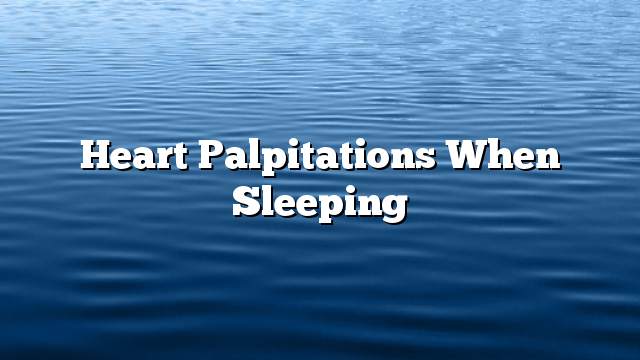the heart
Heart is the most important muscle in the human body, as it pumps oxygenated blood to all members of the body, and is susceptible to diseases in some cases, such as chest pain, heart palpitations, or accelerated pulse, it should be noted that this palpitation is usually linked to sleep, The increase in the number of heartbeat than the normal rate, causing a sense of discomfort, so you should know the symptoms of this situation, and its causes, and how to treat, and this is what we will know you in this article.
Heart palpitations about sleep
Symptoms of heart palpitations at sleep
- Feeling chest pain.
- hard breathing.
- Feeling dizzy, dizziness.
- Fainting.
- Increase the rate of sweating in the body.
- Pain, tired in the left arm.
- Feeling nausea, vomiting.
- A sense of suffocation.
Causes of heart palpitations when sleeping
- Tension, and stress, as a result of deep thought about a particular problem or incident.
- Drink plenty of caffeine-rich beverages, such as coffee, tea, and energy drinks, especially before you go to sleep.
- Increase smoking during the day.
- Take certain pills for diet, herbs or medicines, and without consulting your doctor.
- Eat plenty of high-fat, carbohydrate, and spicy meals.
- Certain diseases, such as high blood pressure, asthma, cough, GERD, thyroid disease, hypothyroidism, and anemia, may have side effects, including heart palpitations.
- Hormonal changes occurring in pregnant women.
- Approaching and during the menstrual cycle.
- Fever infection.
- Frequent exercise, especially before sleep.
- Feeling very scared, anxious, or panic, or experiencing severe psychological stress.
- Lack of oxygen reaching the body.
- High cholesterol in the body.
- There is a fault in one of the electrical network connections in the heart.
- The incidence of atherosclerosis, or heart disease.
- Hormonal changes in women after menopause.
Diagnosis of heart palpitations at sleep
- Know the patient’s history.
- Determine whether any of the above symptoms have been shown to the patient.
- Conduct all necessary medical tests to confirm or deny the patient’s injury.
Treatment of heart palpitations at sleep
- Take certain medications to relieve the disease, consult your doctor.
- Commitment to light exercise, so as to reduce the level of stress and anxiety.
- Take enough sleep every day.
- Avoid stimulant drinks, rich in caffeine, or nicotine.
- Avoid eating before sleeping for four hours.
- Record the number of times the heart beats, its times, and frequency.
- Check with your doctor to check, and to avoid exacerbating the problem.
